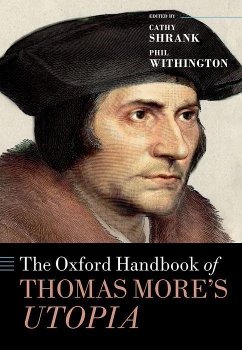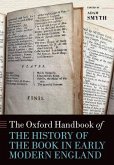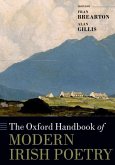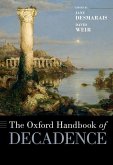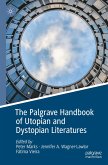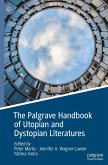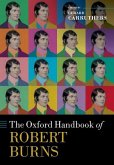- Gebundenes Buch
- Merkliste
- Auf die Merkliste
- Bewerten Bewerten
- Teilen
- Produkt teilen
- Produkterinnerung
- Produkterinnerung
Thomas More's Utopia is one of the most iconic, translated, and influential texts of the European Renaissance. This Handbook offers three different ways of thinking about the book: in terms of its renaissance contexts, its vernacular translations, and its utopian legacies.
Andere Kunden interessierten sich auch für
![The Oxford Handbook of Andrew Marvell The Oxford Handbook of Andrew Marvell]() The Oxford Handbook of Andrew Marvell253,99 €
The Oxford Handbook of Andrew Marvell253,99 €![The Oxford Handbook of the History of the Book in Early Modern England The Oxford Handbook of the History of the Book in Early Modern England]() The Oxford Handbook of the History of the Book in Early Modern England171,99 €
The Oxford Handbook of the History of the Book in Early Modern England171,99 €![The Oxford Handbook of Modern Irish Poetry The Oxford Handbook of Modern Irish Poetry]() The Oxford Handbook of Modern Irish Poetry213,99 €
The Oxford Handbook of Modern Irish Poetry213,99 €![The Oxford Handbook of Decadence The Oxford Handbook of Decadence]() The Oxford Handbook of Decadence226,99 €
The Oxford Handbook of Decadence226,99 €![The Palgrave Handbook of Utopian and Dystopian Literatures The Palgrave Handbook of Utopian and Dystopian Literatures]() The Palgrave Handbook of Utopian and Dystopian Literatures106,99 €
The Palgrave Handbook of Utopian and Dystopian Literatures106,99 €![The Palgrave Handbook of Utopian and Dystopian Literatures The Palgrave Handbook of Utopian and Dystopian Literatures]() The Palgrave Handbook of Utopian and Dystopian Literatures149,99 €
The Palgrave Handbook of Utopian and Dystopian Literatures149,99 €![The Oxford Handbook of Robert Burns The Oxford Handbook of Robert Burns]() The Oxford Handbook of Robert Burns196,99 €
The Oxford Handbook of Robert Burns196,99 €-
-
-
Thomas More's Utopia is one of the most iconic, translated, and influential texts of the European Renaissance. This Handbook offers three different ways of thinking about the book: in terms of its renaissance contexts, its vernacular translations, and its utopian legacies.
Hinweis: Dieser Artikel kann nur an eine deutsche Lieferadresse ausgeliefert werden.
Hinweis: Dieser Artikel kann nur an eine deutsche Lieferadresse ausgeliefert werden.
Produktdetails
- Produktdetails
- Verlag: Hurst & Co.
- Seitenzahl: 816
- Erscheinungstermin: 29. Februar 2024
- Englisch
- Abmessung: 244mm x 180mm x 79mm
- Gewicht: 1588g
- ISBN-13: 9780198881018
- ISBN-10: 0198881010
- Artikelnr.: 68043799
- Herstellerkennzeichnung
- Libri GmbH
- Europaallee 1
- 36244 Bad Hersfeld
- gpsr@libri.de
- Verlag: Hurst & Co.
- Seitenzahl: 816
- Erscheinungstermin: 29. Februar 2024
- Englisch
- Abmessung: 244mm x 180mm x 79mm
- Gewicht: 1588g
- ISBN-13: 9780198881018
- ISBN-10: 0198881010
- Artikelnr.: 68043799
- Herstellerkennzeichnung
- Libri GmbH
- Europaallee 1
- 36244 Bad Hersfeld
- gpsr@libri.de
Cathy Shrank took her degrees in Cambridge in the 1990s, and has worked at King's College London, Aberdeen, and Sheffield. She has published extensively on sixteenth- and seventeenth-century literature and culture, and is a scholarly editor of early modern texts, including Shakespeare's Sonnets. Major grants as PI include the AHRC-funded 'Origins of Early Modern Literature', a Major Leverhulme Research Fellowship, and the AHRC-funded project 'Penniless? Thomas Nashe and Precarity in Historical Perspective'. Phil Withington trained as a social and economic historian at Cambridge in the early 1990s and worked at Aberdeen, Leeds, and Cambridge before joining the Department of History at Sheffield in 2012. He has published extensively on social history of the renaissance, urban culture and urbanization, and the history of intoxicants and intoxication. Major grants as PI include an ESRC mid-career fellowship, the ESRC/AHRC-funded project 'Intoxicants and Early Modernity', and the HERA-funded project 'Intoxicating Spaces'.
* Introduction to Thomas More's Utopia
* Part One: Origins and Contexts
* 1: Angie Hobbs: More and the Republics of Plato
* 2: Carla Suthren: Hythloday's Books: Utopia, Humanism, and the
Republic of Letters
* 3: Andrew Zurcher: Nec minus salutaris quam festivus: Wit, Style, and
the Body in More's Utopia
* 4: David Harris Sacks: The Religions of the Utopians: Sin and
Salvation in Thomas More's Utopia
* 5: Joanne Paul: 'Nothing is private anywhere': Utopia in the context
of More's thought
* 6: Andrew Hadfield: Utopia and Travel Writing
* 7: Jessica S. Hower: Utopia's Empire: Thomas More's Text and the
Early British Atlantic World, c. 1510-1625
* 8: Eliza Hartrich: The Urban Context for Utopia: The English Urban
System, 1450-1516
* 9: Andrew Taylor: Utopia Unbound: The Fabrication of the First Latin
Editions, 1516-1519
* Part Two: Translations and Editions, 1524-1799
* 10: Lucy Nicholas: ad fontes et ad futurum: A Survey of Latin
Utopias
* 11: Gabriela Schmidt: From Prototype to Genre: Translations and
Imitations of Utopia in Early Modern Germany (1524-1753)
* 12: Darcy Kern: Receiving More: Utopia in Spain and New Spain
* 13: Cathy Shrank: Utopia in Sixteenth-Century Italy
* 14: Richard Scholar: Inventing Utopia: The Case of Early Modern
France
* 15: Jennifer Bishop: Utopia in Tudor London: Ralph Robinson's
Translations and their Civic, Personal, and Political Contexts
* 16: Dermot Cavanagh: Dialogue, Debate, and Orality in Ralph
Robinson's Utopias
* 17: Wiep van Bunge: 'Het onbekent en wonderlijk Eyland': Frans van
Hoogstraten's translation of Utopia (1677)
* 18: Phil Withington: Utopia and Gilbert Burnet in 1684
* 19: Floris Verhaart: From Humanism to Enlightenment: Nicolas
Gueudeville and his Translation of Thomas More's Utopia
* 20: Katherine Astbury: Thomas Rousseau, Translator of an Enlightened
Utopia
* Part Three: Translations and Editions after 1800
* 21: Marcus Waithe: False Friends (and their Uses): Thomas More's
Utopia Among the Victorians
* 22: Janet Stewart: The Cultural Politics of Translation: Translating
Thomas More's Utopia into German in the Late Nineteenth Century
* 23: Frances Nethercott: Not Just a Light-Hearted Joke: Russian
Moreana from the Age of Karamzin to the Rise of Social Democracy and
Lenin's 'Stele of Freedom'
* 24: Zsolt Czigányik: Utopia in Eastern Central Europe: The Hungarian
Scene
* 25: Louise Johnson: A Catalan in Search of Humanists: Josep Pin i
Soler's Translation of More's Utopia (1912)
* 26: Cat Moir: The Historical Fallacy: Utopia and the Problem of
Fiction in Weimar Germany
* 27: Teruhito Sako: Japanese Translations of More's Utopia
* 28: Tehyun Ma: The Multiple Lives of Utopia in Modern China
* 29: Peter Hill: Utopia and Utopian Writing in Arabic
* Part Four: Beyond Utopia
* 30: Chloë Houston: Early Modern Utopian Fiction: Utopia and The Isle
of Pines
* 31: Nicole Pohl: Of Survival and Living Together: The
Eighteenth-Century Utopian Novel
* 32: Ingrid Hanson: Conversation, Formation, and Forms of Utopia in
Fin-de-Siècle Socialist Journals
* 33: Rebecca Weaver-Hightower and Musab Bajaber: Utopia, the Imperial
Settler Utopia, and Imperial Settler Science Fiction
* 34: Johan Siebers: Away from the Ancestral Home: Utopia and
Philosophy in Bloch and Beyond
* 35: Miguel Angel Ramiro Avilés: Human Rights and/in Utopia?
* 36: Martin Lutz: Utopia and Moral Economy
* 37: Diane Morgan: Utopia and Architecture
* 38: Alfred Hiatt: Mapping Utopia
* 39: Rhys Williams: Contemporary Utopianism: An Island Renaissance
* Appendix A: Outline of More's Utopia
* Bibliography
* Part One: Origins and Contexts
* 1: Angie Hobbs: More and the Republics of Plato
* 2: Carla Suthren: Hythloday's Books: Utopia, Humanism, and the
Republic of Letters
* 3: Andrew Zurcher: Nec minus salutaris quam festivus: Wit, Style, and
the Body in More's Utopia
* 4: David Harris Sacks: The Religions of the Utopians: Sin and
Salvation in Thomas More's Utopia
* 5: Joanne Paul: 'Nothing is private anywhere': Utopia in the context
of More's thought
* 6: Andrew Hadfield: Utopia and Travel Writing
* 7: Jessica S. Hower: Utopia's Empire: Thomas More's Text and the
Early British Atlantic World, c. 1510-1625
* 8: Eliza Hartrich: The Urban Context for Utopia: The English Urban
System, 1450-1516
* 9: Andrew Taylor: Utopia Unbound: The Fabrication of the First Latin
Editions, 1516-1519
* Part Two: Translations and Editions, 1524-1799
* 10: Lucy Nicholas: ad fontes et ad futurum: A Survey of Latin
Utopias
* 11: Gabriela Schmidt: From Prototype to Genre: Translations and
Imitations of Utopia in Early Modern Germany (1524-1753)
* 12: Darcy Kern: Receiving More: Utopia in Spain and New Spain
* 13: Cathy Shrank: Utopia in Sixteenth-Century Italy
* 14: Richard Scholar: Inventing Utopia: The Case of Early Modern
France
* 15: Jennifer Bishop: Utopia in Tudor London: Ralph Robinson's
Translations and their Civic, Personal, and Political Contexts
* 16: Dermot Cavanagh: Dialogue, Debate, and Orality in Ralph
Robinson's Utopias
* 17: Wiep van Bunge: 'Het onbekent en wonderlijk Eyland': Frans van
Hoogstraten's translation of Utopia (1677)
* 18: Phil Withington: Utopia and Gilbert Burnet in 1684
* 19: Floris Verhaart: From Humanism to Enlightenment: Nicolas
Gueudeville and his Translation of Thomas More's Utopia
* 20: Katherine Astbury: Thomas Rousseau, Translator of an Enlightened
Utopia
* Part Three: Translations and Editions after 1800
* 21: Marcus Waithe: False Friends (and their Uses): Thomas More's
Utopia Among the Victorians
* 22: Janet Stewart: The Cultural Politics of Translation: Translating
Thomas More's Utopia into German in the Late Nineteenth Century
* 23: Frances Nethercott: Not Just a Light-Hearted Joke: Russian
Moreana from the Age of Karamzin to the Rise of Social Democracy and
Lenin's 'Stele of Freedom'
* 24: Zsolt Czigányik: Utopia in Eastern Central Europe: The Hungarian
Scene
* 25: Louise Johnson: A Catalan in Search of Humanists: Josep Pin i
Soler's Translation of More's Utopia (1912)
* 26: Cat Moir: The Historical Fallacy: Utopia and the Problem of
Fiction in Weimar Germany
* 27: Teruhito Sako: Japanese Translations of More's Utopia
* 28: Tehyun Ma: The Multiple Lives of Utopia in Modern China
* 29: Peter Hill: Utopia and Utopian Writing in Arabic
* Part Four: Beyond Utopia
* 30: Chloë Houston: Early Modern Utopian Fiction: Utopia and The Isle
of Pines
* 31: Nicole Pohl: Of Survival and Living Together: The
Eighteenth-Century Utopian Novel
* 32: Ingrid Hanson: Conversation, Formation, and Forms of Utopia in
Fin-de-Siècle Socialist Journals
* 33: Rebecca Weaver-Hightower and Musab Bajaber: Utopia, the Imperial
Settler Utopia, and Imperial Settler Science Fiction
* 34: Johan Siebers: Away from the Ancestral Home: Utopia and
Philosophy in Bloch and Beyond
* 35: Miguel Angel Ramiro Avilés: Human Rights and/in Utopia?
* 36: Martin Lutz: Utopia and Moral Economy
* 37: Diane Morgan: Utopia and Architecture
* 38: Alfred Hiatt: Mapping Utopia
* 39: Rhys Williams: Contemporary Utopianism: An Island Renaissance
* Appendix A: Outline of More's Utopia
* Bibliography
* Introduction to Thomas More's Utopia
* Part One: Origins and Contexts
* 1: Angie Hobbs: More and the Republics of Plato
* 2: Carla Suthren: Hythloday's Books: Utopia, Humanism, and the
Republic of Letters
* 3: Andrew Zurcher: Nec minus salutaris quam festivus: Wit, Style, and
the Body in More's Utopia
* 4: David Harris Sacks: The Religions of the Utopians: Sin and
Salvation in Thomas More's Utopia
* 5: Joanne Paul: 'Nothing is private anywhere': Utopia in the context
of More's thought
* 6: Andrew Hadfield: Utopia and Travel Writing
* 7: Jessica S. Hower: Utopia's Empire: Thomas More's Text and the
Early British Atlantic World, c. 1510-1625
* 8: Eliza Hartrich: The Urban Context for Utopia: The English Urban
System, 1450-1516
* 9: Andrew Taylor: Utopia Unbound: The Fabrication of the First Latin
Editions, 1516-1519
* Part Two: Translations and Editions, 1524-1799
* 10: Lucy Nicholas: ad fontes et ad futurum: A Survey of Latin
Utopias
* 11: Gabriela Schmidt: From Prototype to Genre: Translations and
Imitations of Utopia in Early Modern Germany (1524-1753)
* 12: Darcy Kern: Receiving More: Utopia in Spain and New Spain
* 13: Cathy Shrank: Utopia in Sixteenth-Century Italy
* 14: Richard Scholar: Inventing Utopia: The Case of Early Modern
France
* 15: Jennifer Bishop: Utopia in Tudor London: Ralph Robinson's
Translations and their Civic, Personal, and Political Contexts
* 16: Dermot Cavanagh: Dialogue, Debate, and Orality in Ralph
Robinson's Utopias
* 17: Wiep van Bunge: 'Het onbekent en wonderlijk Eyland': Frans van
Hoogstraten's translation of Utopia (1677)
* 18: Phil Withington: Utopia and Gilbert Burnet in 1684
* 19: Floris Verhaart: From Humanism to Enlightenment: Nicolas
Gueudeville and his Translation of Thomas More's Utopia
* 20: Katherine Astbury: Thomas Rousseau, Translator of an Enlightened
Utopia
* Part Three: Translations and Editions after 1800
* 21: Marcus Waithe: False Friends (and their Uses): Thomas More's
Utopia Among the Victorians
* 22: Janet Stewart: The Cultural Politics of Translation: Translating
Thomas More's Utopia into German in the Late Nineteenth Century
* 23: Frances Nethercott: Not Just a Light-Hearted Joke: Russian
Moreana from the Age of Karamzin to the Rise of Social Democracy and
Lenin's 'Stele of Freedom'
* 24: Zsolt Czigányik: Utopia in Eastern Central Europe: The Hungarian
Scene
* 25: Louise Johnson: A Catalan in Search of Humanists: Josep Pin i
Soler's Translation of More's Utopia (1912)
* 26: Cat Moir: The Historical Fallacy: Utopia and the Problem of
Fiction in Weimar Germany
* 27: Teruhito Sako: Japanese Translations of More's Utopia
* 28: Tehyun Ma: The Multiple Lives of Utopia in Modern China
* 29: Peter Hill: Utopia and Utopian Writing in Arabic
* Part Four: Beyond Utopia
* 30: Chloë Houston: Early Modern Utopian Fiction: Utopia and The Isle
of Pines
* 31: Nicole Pohl: Of Survival and Living Together: The
Eighteenth-Century Utopian Novel
* 32: Ingrid Hanson: Conversation, Formation, and Forms of Utopia in
Fin-de-Siècle Socialist Journals
* 33: Rebecca Weaver-Hightower and Musab Bajaber: Utopia, the Imperial
Settler Utopia, and Imperial Settler Science Fiction
* 34: Johan Siebers: Away from the Ancestral Home: Utopia and
Philosophy in Bloch and Beyond
* 35: Miguel Angel Ramiro Avilés: Human Rights and/in Utopia?
* 36: Martin Lutz: Utopia and Moral Economy
* 37: Diane Morgan: Utopia and Architecture
* 38: Alfred Hiatt: Mapping Utopia
* 39: Rhys Williams: Contemporary Utopianism: An Island Renaissance
* Appendix A: Outline of More's Utopia
* Bibliography
* Part One: Origins and Contexts
* 1: Angie Hobbs: More and the Republics of Plato
* 2: Carla Suthren: Hythloday's Books: Utopia, Humanism, and the
Republic of Letters
* 3: Andrew Zurcher: Nec minus salutaris quam festivus: Wit, Style, and
the Body in More's Utopia
* 4: David Harris Sacks: The Religions of the Utopians: Sin and
Salvation in Thomas More's Utopia
* 5: Joanne Paul: 'Nothing is private anywhere': Utopia in the context
of More's thought
* 6: Andrew Hadfield: Utopia and Travel Writing
* 7: Jessica S. Hower: Utopia's Empire: Thomas More's Text and the
Early British Atlantic World, c. 1510-1625
* 8: Eliza Hartrich: The Urban Context for Utopia: The English Urban
System, 1450-1516
* 9: Andrew Taylor: Utopia Unbound: The Fabrication of the First Latin
Editions, 1516-1519
* Part Two: Translations and Editions, 1524-1799
* 10: Lucy Nicholas: ad fontes et ad futurum: A Survey of Latin
Utopias
* 11: Gabriela Schmidt: From Prototype to Genre: Translations and
Imitations of Utopia in Early Modern Germany (1524-1753)
* 12: Darcy Kern: Receiving More: Utopia in Spain and New Spain
* 13: Cathy Shrank: Utopia in Sixteenth-Century Italy
* 14: Richard Scholar: Inventing Utopia: The Case of Early Modern
France
* 15: Jennifer Bishop: Utopia in Tudor London: Ralph Robinson's
Translations and their Civic, Personal, and Political Contexts
* 16: Dermot Cavanagh: Dialogue, Debate, and Orality in Ralph
Robinson's Utopias
* 17: Wiep van Bunge: 'Het onbekent en wonderlijk Eyland': Frans van
Hoogstraten's translation of Utopia (1677)
* 18: Phil Withington: Utopia and Gilbert Burnet in 1684
* 19: Floris Verhaart: From Humanism to Enlightenment: Nicolas
Gueudeville and his Translation of Thomas More's Utopia
* 20: Katherine Astbury: Thomas Rousseau, Translator of an Enlightened
Utopia
* Part Three: Translations and Editions after 1800
* 21: Marcus Waithe: False Friends (and their Uses): Thomas More's
Utopia Among the Victorians
* 22: Janet Stewart: The Cultural Politics of Translation: Translating
Thomas More's Utopia into German in the Late Nineteenth Century
* 23: Frances Nethercott: Not Just a Light-Hearted Joke: Russian
Moreana from the Age of Karamzin to the Rise of Social Democracy and
Lenin's 'Stele of Freedom'
* 24: Zsolt Czigányik: Utopia in Eastern Central Europe: The Hungarian
Scene
* 25: Louise Johnson: A Catalan in Search of Humanists: Josep Pin i
Soler's Translation of More's Utopia (1912)
* 26: Cat Moir: The Historical Fallacy: Utopia and the Problem of
Fiction in Weimar Germany
* 27: Teruhito Sako: Japanese Translations of More's Utopia
* 28: Tehyun Ma: The Multiple Lives of Utopia in Modern China
* 29: Peter Hill: Utopia and Utopian Writing in Arabic
* Part Four: Beyond Utopia
* 30: Chloë Houston: Early Modern Utopian Fiction: Utopia and The Isle
of Pines
* 31: Nicole Pohl: Of Survival and Living Together: The
Eighteenth-Century Utopian Novel
* 32: Ingrid Hanson: Conversation, Formation, and Forms of Utopia in
Fin-de-Siècle Socialist Journals
* 33: Rebecca Weaver-Hightower and Musab Bajaber: Utopia, the Imperial
Settler Utopia, and Imperial Settler Science Fiction
* 34: Johan Siebers: Away from the Ancestral Home: Utopia and
Philosophy in Bloch and Beyond
* 35: Miguel Angel Ramiro Avilés: Human Rights and/in Utopia?
* 36: Martin Lutz: Utopia and Moral Economy
* 37: Diane Morgan: Utopia and Architecture
* 38: Alfred Hiatt: Mapping Utopia
* 39: Rhys Williams: Contemporary Utopianism: An Island Renaissance
* Appendix A: Outline of More's Utopia
* Bibliography

